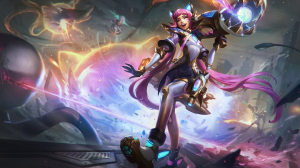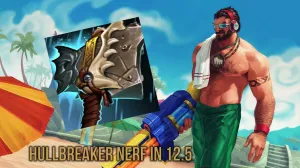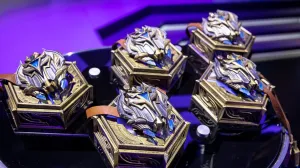The Overwatch League was widely believed to be a promising opportunity when Activision Blizzard sought out investors ahead of the inaugural season in 2018. Over 400,000 viewers tuned in for the inaugural weekend to see top organizations play a new game by one of the biggest game studios and publishers in the world
Internally, at least for former Gen.G executive and current TSM vice president of esports Dominic Kallas, things started to sour quickly.
“As things started kicking off here in 2018 you already started to see the canary in the coal mine,” he said. “Probably a couple weeks after the first initial game.”
Viewership settled to upwards of 170,000 for regular season games and operations for the league became a huge time investment for organizations who had invested millions for one of 12 team spots.

Overwatch and Call of Duty aren’t ready for a closed system
It became clear that the numbers Overwatch pulled in did not warrant a closed ecosystem that prevented the majority of teams and players from actively taking part in competitive play. Neither Overwatch or Call of Duty was ready for that type of change when franchising became the focus for Activision Blizzard, according to Kallas.
“In those ecosystems, I think the league itself has actually hurt the game more than it’s helped,” Kallas said. “It’s just disappointing.”
Now, more than three years later, the Overwatch and Call of Duty Leagues are in turmoil. Activision Blizzard is going through multiple lawsuits due to a “frat boy” culture of sexism that has festered for years. Both leagues have fallen out of the limelight due to actions by a parent company that could look radically different once a near $70 billion dollar acquisition closes in six to 18 months.
“I feel bad for a lot of the positions that the players [and] organizations are in right now,” Kallas said. “There are many fires going on at Activision Blizzard and so much negativity that, instead of spending time and thinking about ways to improve the league, you’re spending so much time putting out fires.”

Worries about the stability of the Overwatch and Call of Duty leagues came long before the Department of Fair Employment and Housing’s lawsuit against Activision Blizzard became public, though. When Activision Blizzard began looking for investors for the Call of Duty League, many wanted to know how it would be different from the franchised league that came before it.
It turns out that it would be almost exactly the same.
“I saw there was basically no change,” Kallas said. “I think there were pretty unanimous head nods around the room that this is not something that [we] wanted to be part of.”
Call of Duty, unlike Overwatch, had a massive fanbase and competitive community behind it before franchising came into the conversation. The Call of Duty World League saw hundreds of open bracket teams travel to every LAN in order to compete for the small chance that they wouldn’t leave empty-handed.
Gen.G had a Call of Duty team before the Call of Duty League was formed. Former Florida Mutineer Colt “Havok” McLendon, LA Thieves’ Dylan “Envoy” Hannon and Minnesota RØKKR Michael “MajorManiak” Szymaniak played under former Seattle coach Joey “Nubzy” DiGiacomo.

Avoiding Call of Duty and Overwatch altogether
Kallas was confident that organizations like TSM and Gen.G would still be in Call of Duty if the Call of Duty World League was still in place. It wasn’t “groundbreaking, but it had a good community,” he added.
Kallas chose to join TSM in early 2021 in part because the organization wasn’t involved in either Call of Duty or Overwatch.
“Not only is it just bad PR, but it takes a lot of time and focus to be a member of one of those leagues,” he said. “There are a lot of issues and meetings and things that need to happen for things to get sorted.”
He didn’t want the image of Tim “Timthetatman” Betar flying through the air in a glitched “Harry Potter” car in Call of Duty: Warzone harming the reputation of whatever organization he was joining.
The Harry Potter car isn’t funny after all.
byu/seanfitz12 inCODWarzone
Despite the turmoil that has flooded all of Activision Blizzard’s properties over the last few years, many are choosing to be optimistic after Microsoft moved to acquire the company for $70 billion. The deal won’t close until 2023 at the earliest – leaving plenty of room for speculation about how these leagues will change going forward.
Uncertainty and hope with the Microsoft acquisition
“I think this Microsoft acquisition gives at least hope within the community that things can change,” Kallas said. “Whether that’s developer changes, whether that’s changes to esports on the whole. At the end of the day, I think that gives hope and excitement to a lot of people.”
Microsoft could revamp how both leagues work. They could outsource to partners who handle the competitive side of their properties similarly to how Esports Engine handles the Halo Championship Series alongside Microsoft and 343 Industries. We’re already seeing Esports Engine play a part within the Call of Duty League.
The products behind both the Overwatch and Call of Duty leagues are a technical mess. Bugs, glitches and lag hound Call of Duty: Vanguard while we don’t even know when Overwatch 2 will be playable, let alone released. Teams and players are hoping that Microsoft is able to steer both ships right.
Neither the Call of Duty or Overwatch leagues were central parts of the acquisition, but they could both face major changes going forward. For organizations that invested tens of millions into these leagues, all they have is uncertainty about the future.








